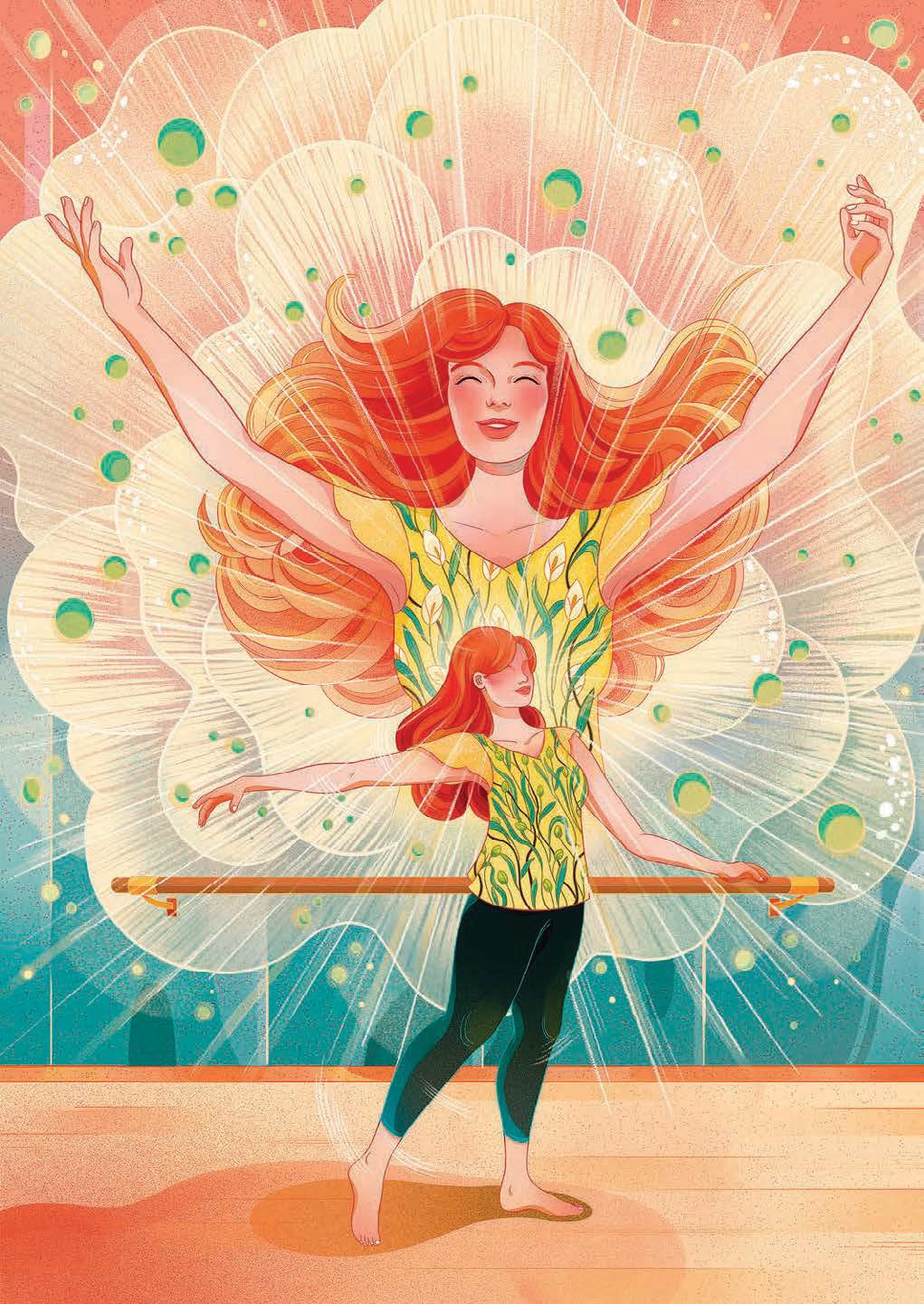Versuchen GOLD - Frei
Let's Dance!
Reader's Digest US
|March/April 2024
It's good for your body, soul and even your brain

Wearing all black and sitting on a tufted white ottoman in her sunlit living room, Sarah Robichaud is teaching a routine inspired by modern ballet to 80 students on Zoom.
The Bolshoi-trained dancer spreads her arms wide in exaggerated movements to a slow cover of The Proclaimers' "I'm Gonna Be (500 Miles)" as her students get into the groove.
"We're just going to start with a gentle, gentle sway, back and forth," Robichaud says to the group. "I want you to think that there's a thread attached to your wrist and someone's pulling that thread from side to side."
Many of her students are seated as well. More than half of them have Parkinson's disease and typically movement can be difficult, but when they try to mirror her fluid and graceful movements, a look of ease comes over them.
Growing evidence shows that dancing can boost brain health and help manage symptoms of neurocognitive and movement disorders, including Parkinson's, multiple sclerosis (MS), Alzheimer's, dementia and brain injury. For example, a 2021 York University study showed that weekly dance training improved motor function and daily living for those with mild to moderate Parkinson's. This piggybacks on other findings that show how activities that target balance, coordination, flexibility, creativity and memory work can improve Parkinson's symptoms.
Robichaud started Dancing with Parkinson's in 2007 as a way to give back to her community. A few years later, her grandfather was diagnosed with the disease. Robichaud was able to dance with him in his long-term care home until his final days.
"The compassion and care that I have for our dancers is that they're all my grandfather," she says.
Recently, one of her students, a man in his 50s who had been adamant that dancing wasn't for him, said that he now has more dexterity in his hands and generally moves more freely.
"I can't deny how this is changing my life," he told her.
Diese Geschichte stammt aus der March/April 2024-Ausgabe von Reader's Digest US.
Abonnieren Sie Magzter GOLD, um auf Tausende kuratierter Premium-Geschichten und über 9.000 Zeitschriften und Zeitungen zuzugreifen.
Sie sind bereits Abonnent? Anmelden
WEITERE GESCHICHTEN VON Reader's Digest US

Reader's Digest US
Pumped Up
A man who had never been in a fight in his life finds himself in a fight for his life
3 mins
February/March 2026

Reader's Digest US
TRUE CHAMPIONS
Why these high school hoopers gave their trophy to the other team
3 mins
February/March 2026
Reader's Digest US
A DOG OWNER - SAVES HIS BEST FRIEND
Bonner Herring's morning ritual consisted of scanning the pond on his property in Southport, North Carolina, for an 8-foot-long alligator that had gotten into the habit of sunning itself on the shore before starting its day. If the coast was clear, Herring would let Strike, his 4-year-old black Labrador retriever, out to run around.
1 mins
February/March 2026

Reader's Digest US
A FARMER SOWS A PROPOSAL
If Will Henderson were a poet, he might have proposed to his longtime girlfriend, Steph Carter, by writing an ode to her eyes.
1 min
February/March 2026

Reader's Digest US
It's Not Whether You Fall ...
...It's how you recover, as a newly widowed father learns over and over
5 mins
February/March 2026

Reader's Digest US
My Heart Will Go On
A medical journalist's surprise heart attack reveals how much she didn't know about the No. 1 killer of women—and men
11 mins
February/March 2026

Reader's Digest US
A FRIEND - ANSWERS THE CALL
Kristen Kruse knew better than most that her friend of 20-plus years, Stephanie Zimmerer, was not one to drop everything and travel 1,500 miles on a whim. But then she called Zimmerer with startling news.
2 mins
February/March 2026

Reader's Digest US
HOW NOT TO WASTE 11,849 HUMAN ORGANS
Everything has to go right for a lifesaving transplant to happen. Too often, the system makes it impossible.
11 mins
February/March 2026

Reader's Digest US
Where Dogs Can't Sniff, This Otter Dives In
SINCE LAST JANUARY, a new search-and-recovery team member has been in hot pursuit of missing persons in southwest Florida's lakes, rivers and bays.
1 min
February/March 2026

Reader's Digest US
YANKEE DOODLE ANDY
My weekend in the Revolutionary War
3 mins
February/March 2026
Listen
Translate
Change font size

